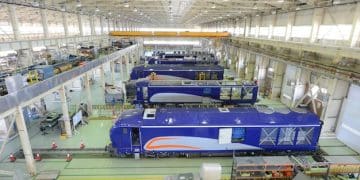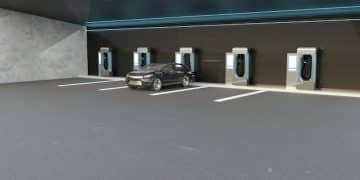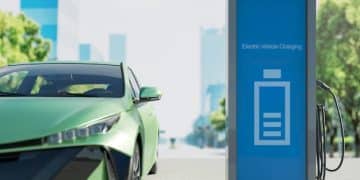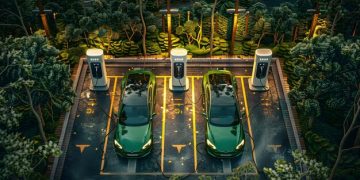Electric Vehicle Shift: Projected Changes in the Automotive Workforce
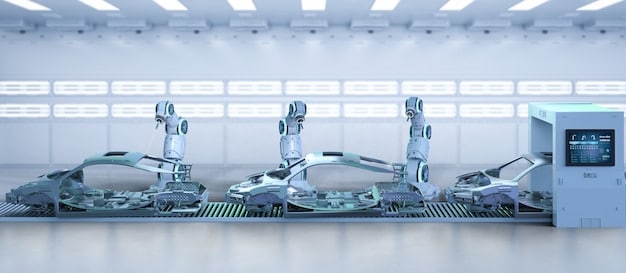
The shift towards electric vehicles (EVs) is projected to significantly alter the automotive workforce, leading to a decline in jobs related to traditional combustion engines and a surge in demand for skilled workers in EV-specific areas like battery technology, software engineering, and charging infrastructure.
The automotive industry is undergoing a massive transformation, driven by the global shift towards electric vehicles. But what are the projected changes in the automotive workforce due to the shift towards electric vehicles? This transition is not just about changing the cars we drive; it’s reshaping the entire landscape of automotive jobs.
How Electric Vehicles are Reshaping the Auto Industry
The rise of electric vehicles (EVs) is more than just a trend; it’s a fundamental shift in the automotive industry. This change is impacting everything from manufacturing processes to the skills required in the workforce. The transition from internal combustion engines (ICE) to electric drivetrains is creating both challenges and opportunities for automotive professionals.
The demand for EVs is growing rapidly, driven by factors such as stricter emissions regulations, increasing consumer awareness, and advancements in battery technology. As a result, automakers are investing heavily in EV production, which requires a different set of skills and expertise compared to traditional car manufacturing.
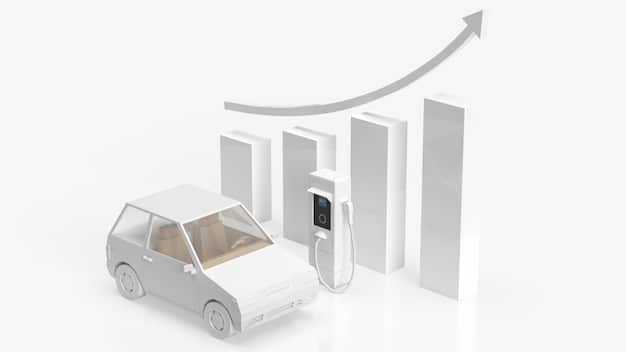
The Decline of Traditional Automotive Jobs
One of the most significant changes is the decline in jobs related to the production of ICE vehicles. These include roles such as engine mechanics, transmission specialists, and fuel system engineers. As EVs become more prevalent, the demand for these skills will decrease, leading to potential job losses in these areas.
- Reduced Complexity: EVs have fewer moving parts than ICE vehicles, which means less maintenance and repair work.
- Shift in Manufacturing: The focus is shifting from engine and transmission manufacturing to battery production and electric motor assembly.
- Changing Skill Sets: Traditional automotive technicians need to acquire new skills to work on EVs.
The shift towards EVs is not just about replacing one technology with another; it’s about fundamentally changing the way cars are designed, manufactured, and serviced. This requires a workforce that is equipped with the skills and knowledge to thrive in this new environment.
The Rise of New Skills and Expertise
While some jobs are becoming obsolete, the EV revolution is also creating new opportunities for skilled workers. These include roles in battery technology, software engineering, charging infrastructure, and data analytics. The demand for these skills is expected to grow significantly in the coming years.
Automakers and suppliers are investing heavily in training and development programs to equip their employees with the skills needed to work on EVs. However, there is still a significant skills gap in the industry, which needs to be addressed through education and training initiatives.
Key Areas of Growth
Several key areas are experiencing rapid growth in demand for skilled workers. These include battery technology, which is critical for the performance and range of EVs, and software engineering, which is essential for developing and maintaining the complex control systems that govern EV operation.
- Battery Technology: Developing and manufacturing high-performance batteries requires expertise in chemistry, materials science, and engineering.
- Software Engineering: EVs rely on sophisticated software to control everything from motor performance to battery management to infotainment systems.
- Charging Infrastructure: Building and maintaining a robust charging infrastructure is essential for widespread EV adoption.
The rise of EVs is creating a demand for workers with expertise in areas such as data analytics, cybersecurity, and artificial intelligence. These skills are needed to optimize EV performance, protect against cyber threats, and develop new features and services for EV owners.
Impact on Manufacturing and Assembly Processes
The shift towards EVs is also impacting manufacturing and assembly processes. EVs require different manufacturing techniques compared to ICE vehicles, with a greater emphasis on automation and robotics. This is leading to changes in the types of jobs available in manufacturing plants, with a greater demand for skilled technicians and engineers.
EV manufacturing plants are becoming more high-tech, with advanced automation systems and data-driven processes. This requires a workforce that is comfortable working with these technologies and has the skills to troubleshoot and maintain them.
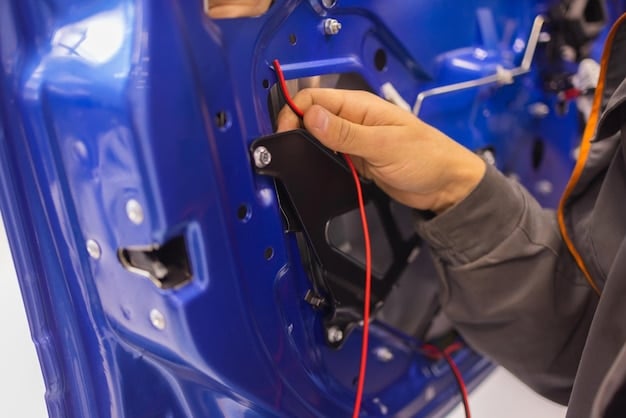
Automation and Robotics
Automation and robotics are playing an increasingly important role in EV manufacturing. Robots are used to perform tasks such as welding, painting, and assembly, which helps to improve efficiency and reduce costs. However, this also means that fewer manual labor jobs are available.
The increasing use of automation and robotics in manufacturing plants is leading to a shift in the types of jobs available. There is a growing demand for skilled technicians and engineers who can program, maintain, and repair these systems.
The Role of Training and Education
Training and education are essential for ensuring that the automotive workforce has the skills needed to thrive in the EV era. Automakers, suppliers, and educational institutions are all playing a role in providing training and development opportunities for automotive professionals.
Many automakers are investing in internal training programs to upskill their existing workforce. These programs provide employees with the skills and knowledge needed to work on EVs, including courses on battery technology, software engineering, and charging infrastructure.
Educational Initiatives
Educational institutions are also playing a critical role in preparing the next generation of automotive professionals. Many universities and technical colleges are offering courses and programs in EV technology, which provide students with the skills and knowledge needed to succeed in the industry.
- Curriculum Development: Educational institutions are developing new curricula to address the skills gap in the EV industry.
- Partnerships with Industry: Many universities are partnering with automakers and suppliers to provide students with hands-on experience.
- Online Learning: Online learning platforms are offering courses and programs in EV technology, making it easier for professionals to upskill.
The automotive industry is changing rapidly, and it’s essential for workers to stay up-to-date on the latest technologies and trends. Training and education are critical for ensuring that the workforce has the skills needed to thrive in the EV era.
Government Policies and Industry Initiatives
Government policies and industry initiatives are also playing a role in shaping the automotive workforce of the future. Governments are providing incentives for EV adoption, which is driving demand for EVs and creating new jobs in the industry.
Many governments are also investing in training and education programs to support the transition to EVs. These programs provide funding for educational institutions, training providers, and automakers to develop and deliver EV-related training.
Incentives for EV Adoption
Governments around the world are providing incentives for EV adoption, such as tax credits, rebates, and subsidies. These incentives are helping to drive demand for EVs and create new jobs in the industry.
- Tax Credits: Many governments offer tax credits for consumers who purchase EVs.
- Rebates: Some governments offer rebates for consumers who purchase EVs.
- Subsidies: Governments may also provide subsidies to automakers and suppliers to support EV production.
Industry initiatives are also playing a role in supporting the transition to EVs. Many automakers and suppliers are investing in research and development to improve EV technology and reduce costs. This is helping to make EVs more affordable and accessible to consumers.
The Future of Automotive Jobs
The future of automotive jobs is closely linked to the continued growth of the EV market. As EVs become more prevalent, the demand for skilled workers in EV-related areas will continue to grow, while the demand for traditional automotive skills will decline.
The automotive industry is undergoing a significant transformation, and it’s essential for workers to adapt to these changes. This requires a willingness to learn new skills and embrace new technologies. By investing in training and education, automotive professionals can position themselves for success in the EV era.
| Key Point | Brief Description |
|---|---|
| 📉 Decline in ICE Jobs | Reduced need for engine mechanics due to EVs needing less maintenance. |
| 📈 Demand for EV Skills | Increased need for specialists in battery tech, software, and infrastructure. |
| 🤖 Automation | Greater use of robots in EV manufacturing, changing job types. |
| 📚 Training is Key | Upskilling and reskilling programs are important for workforce transition. |
FAQ
▼
EVs will create roles in battery manufacturing, software development for EVs, charging infrastructure maintenance, and data analytics focusing on EV performance and user behavior.
▼
Workers can pursue training in EV-specific technologies like battery systems, electric motors, and automotive software. Certifications in these areas can also greatly help.
▼
Automation will increase efficiency, but it will also create new needs for skilled technicians to manage the automation and engineers who work with software.
▼
Rural areas might see fewer auto repair jobs but can benefit from new opportunities in EV charging infrastructure and servicing EVs designed for agriculture.
▼
Governments can incentivize training programs, support infrastructure development, and offer support for displaced workers to ensure a smoother transition in the automotive workforce.
Conclusion
The projected changes in the automotive workforce due to the shift towards electric vehicles are substantial, requiring proactive adaptation and strategic investment in training. While some traditional roles may diminish, new opportunities are emerging in EV-related domains. Successfully navigating this transition depends on collaboration between industry, educators, and government to ensure a skilled and adaptable workforce.

